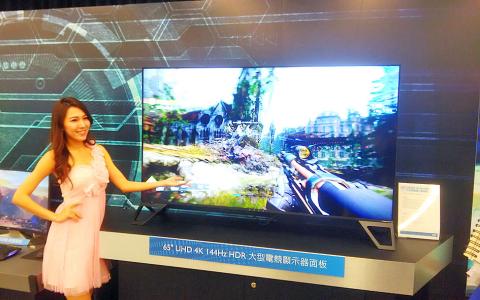AU Optronics Corp (AUO, 友達光電) yesterday said it is working with clients to offer flexible displays for their new foldable phones, likely later this year, an early sign that the industry is embracing such dual-screen phones for lack of major killer features.
That could be a breakthrough for the LCD panel maker, which has been supplying OLEDs for smaller devices, mostly wearables, in the past few years.
AUO’s remarks came after the world’s two biggest mobile phone companies — South Korea’s Samsung Electronics Co and China’s Huawei Technologies Co (華為) — recently showcased their latest foldable phones, the Galaxy Fold and Mate X respectively.

Photo: CNA
Such foldable phones “are a novelty that adopts display technologies in a new way and make such phones a new hybrid of mobile phones and tablets,” AUO chairman Paul Peng (彭双浪) told a media briefing.
“AUO has been putting resources in developing such displays. Hopefully we will see AUO’s flexible displays used in new foldable phones from branded vendors in 2019,” he said.
Unlike Huawei’s out-folding display, AUO has focused on in-folding displays, which have higher technological barriers, Peng said.
AUO plans to produce OLEDs at a 4.5-generation plant in Singapore for foldable phones, ordinary mobile phones and wearable devices.
Foldable phones are a “breakthrough,” but it remains to be seen how consumers will react to their high prices, and it would take time to see an uptake in such phones, Peng said.
The Galaxy Fold and Mate X have been priced at about US$2,000.
Samsung said the Galaxy Fold, which has a 7.3-inch main display and a 4.6-inch cover display, would reach stores next quarter.
New orders have started to trickle in after supply chain inventories were falling to healthy levels after the Lunar New Year holiday, and it has also received some orders that were shifted away from peers that have hit bottlenecks in boosting production, AUO said.
The order outlook for next quarter seems positive, which would push its factory utilization to almost 100 percent, it said.
AUO, which posted its first quarterly losses last quarter due to an overcapacity-driven industry slump, said oversupply would become a norm and it was increasing proportions of value-added products in its product lineup.
The value-added products, which include 85-inch ultra-high-definition 8K TV panels and flat panels for gaming PCs, would account for 50 percent of its revenue, AUO said.

‘SWASTICAR’: Tesla CEO Elon Musk’s close association with Donald Trump has prompted opponents to brand him a ‘Nazi’ and resulted in a dramatic drop in sales Demonstrators descended on Tesla Inc dealerships across the US, and in Europe and Canada on Saturday to protest company chief Elon Musk, who has amassed extraordinary power as a top adviser to US President Donald Trump. Waving signs with messages such as “Musk is stealing our money” and “Reclaim our country,” the protests largely took place peacefully following fiery episodes of vandalism on Tesla vehicles, dealerships and other facilities in recent weeks that US officials have denounced as terrorism. Hundreds rallied on Saturday outside the Tesla dealership in Manhattan. Some blasted Musk, the world’s richest man, while others demanded the shuttering of his

Taiwan’s official purchasing managers’ index (PMI) last month rose 0.2 percentage points to 54.2, in a second consecutive month of expansion, thanks to front-loading demand intended to avoid potential US tariff hikes, the Chung-Hua Institution for Economic Research (CIER, 中華經濟研究院) said yesterday. While short-term demand appeared robust, uncertainties rose due to US President Donald Trump’s unpredictable trade policy, CIER president Lien Hsien-ming (連賢明) told a news conference in Taipei. Taiwan’s economy this year would be characterized by high-level fluctuations and the volatility would be wilder than most expect, Lien said Demand for electronics, particularly semiconductors, continues to benefit from US technology giants’ effort

ADVERSARIES: The new list includes 11 entities in China and one in Taiwan, which is a local branch of Chinese cloud computing firm Inspur Group The US added dozens of entities to a trade blacklist on Tuesday, the US Department of Commerce said, in part to disrupt Beijing’s artificial intelligence (AI) and advanced computing capabilities. The action affects 80 entities from countries including China, the United Arab Emirates and Iran, with the commerce department citing their “activities contrary to US national security and foreign policy.” Those added to the “entity list” are restricted from obtaining US items and technologies without government authorization. “We will not allow adversaries to exploit American technology to bolster their own militaries and threaten American lives,” US Secretary of Commerce Howard Lutnick said. The entities

Minister of Finance Chuang Tsui-yun (莊翠雲) yesterday told lawmakers that she “would not speculate,” but a “response plan” has been prepared in case Taiwan is targeted by US President Donald Trump’s reciprocal tariffs, which are to be announced on Wednesday next week. The Trump administration, including US Secretary of the Treasury Scott Bessent, has said that much of the proposed reciprocal tariffs would focus on the 15 countries that have the highest trade surpluses with the US. Bessent has referred to those countries as the “dirty 15,” but has not named them. Last year, Taiwan’s US$73.9 billion trade surplus with the US